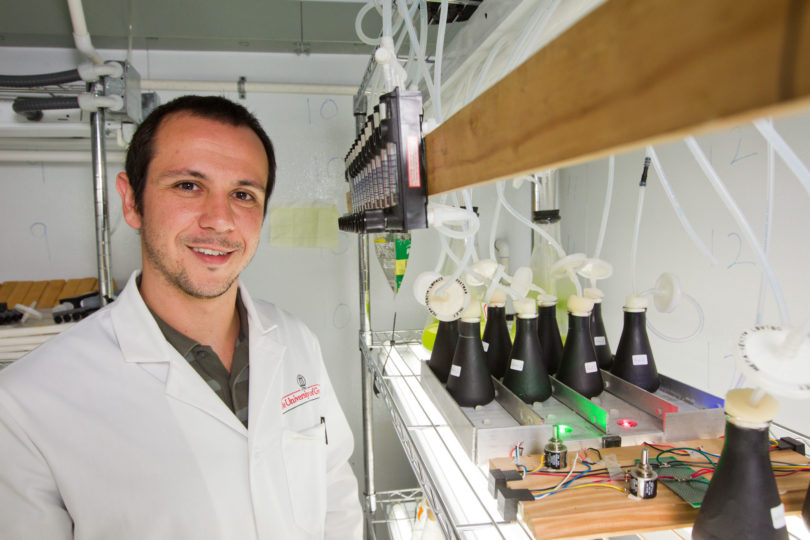UGA doctoral student Erico Rolim de -Mattos envisions a world in which exploding populations, climate change and land overdevelopment has rendered mankind incapable of producing enough food to sustain itself. This scenario is a real possibility; and it has captured the minds of specialists from organizations like NASA and the United Nations.
Mattos has an idea that may help solve the problem, and it recently won him a $30,000 scholarship to an intensive 10-week graduate studies program at Singularity University, a Silicon Valley-based ideas incubator that seeks to solve the planet’s most pressing challenges using advanced technologies.
He proposes the use of LED lights and advanced computer monitoring systems to provide artificial light in structures known as vertical farms. These immense greenhouse-like buildings are dedicated to the production of indoor food crops.
“The big problem with vertical farming is energy consumption,” said Mattos, a doctoral candidate in the College of Agricultural and Environmental Sciences’ department of crop and soil sciences. “Using this intelligent light system that we are developing here, we can make vertical farms feasible from the point of view of lights.”
A large indoor farm using traditional grow lights would require massive amounts of electricity to operate. But Mattos’ system works more efficiently. An energy efficient LED array above crops provides the light. As the light shines, a device called a chlorophyll fluorometer measures the plant’s energy use efficiency and sends it to a computer, which runs an algorithm that determines if the plant needs more light, less light or even light of different wavelengths and turns the appropriate LEDs on or off.
This process takes place in real time, and it ensures that the plants receive optimum lighting conditions without wasting power on traditional bulbs that burn for set periods of time.
Mattos discovered the usefulness of this system while working on the production of algae at the UGA Bioconversion Research and Education Center, where researchers study and test biomass fuel sources. He presently is testing the efficacy of the LED system as a method of increasing algae biomass.
Because it is not economically practical to implement vertical farms on a large scale, Mattos and his collaborators are working to reduce the cost and boost production of a system that may prove useful in the event of a global food crisis.
As one of 80 students selected worldwide to attend Singularity University’s program, Mattos will have the opportunity to meet with other researchers, entrepreneurs and inventors who will help him further develop his plan.
His adviser, K.C. Das, a professor of biological and agricultural engineering and member of UGA’s bioenergy Systems Research Institute, praised his drive and determination.
“Erico is a very energetic, hard-working and innovative person,” said Das. “He has been quite successful both in his research and taking his ideas to the next level.”
UGA is one of two U.S. universities to hold competitions for the SU program. Mattos is the third UGA graduate student to attend the program. “When all these people from different areas try to solve problems and combine all their knowledge, it is a huge experience for everybody,” Mattos said. “I can come back to UGA with a lot of new ideas, new points of view and new approaches, and hopefully I can share these with faculty members and students to improve the community.”








